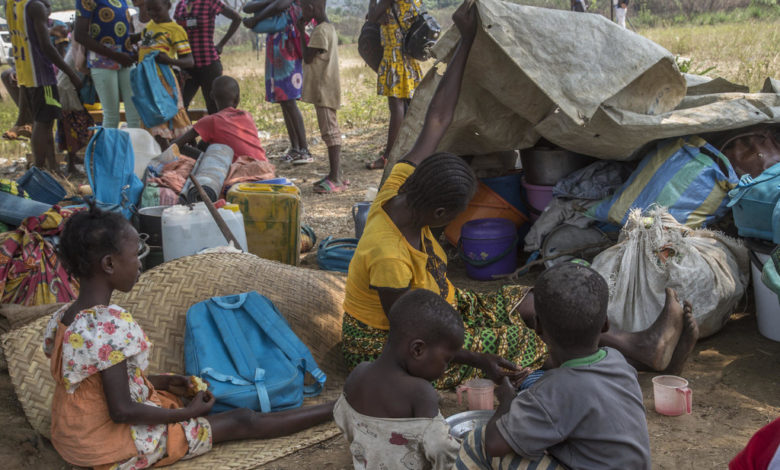UNHCR Wants Better Humanitarian Access In CAR As Refugees Figures Increase
The United Nations High Commission for Refugees, UNCHR, has appealed for better access to humanitarian aids for refugees in the Central African Republic, CAR as refugee numbers rise.

The UN Refugee Agency, UNHCR says it needs better humanitarian access to the needy in countries where there are citizens of the Central African Republic who taking asylum as refugees.
The agency also appealed for genuine dialogue to reduce tensions in the CAR.
“We reiterate our appeal for a sustainable and solid support of the international community in order to guarantee the resumption of an adequate humanitarian response and the reinforcement of perspectives for lasting solutions”, said Boris Cheshirkov, the UNHCR spokesperson.
Since the beginning of the armed conflict in their country in 2014, at least 107,000 Central African Republic citizens have crossed their national borders to seek refuge in neighbouring countries.
The majority of these refugees are currently in the Democratic Republic of Congo, hosting more than 92,000, followed by Chad housing 6,726. Cameroon comes next with 5,730 and the Republic of Congo (Brazzaville) which is currently home to 2,984 Central African Republic refugees.
According to the United Nations Office for the Coordination of Humanitarian Affairs (UNOCHA), more than 100,000 persons are internally displaced since the beginning of the current fighting in Dec. 2020.
The total number of Central African Republic citizens displaced in their country, and the sub-region now stands at 1.5 million, about one-third of the country’s population estimated at 4.8 million inhabitants.
“Many of these refugees live in deplorable conditions in the bushes as they fear new attacks against their villages,” the UNHCR spokesperson said.
On the ground, Cheshirkov said UNHCR teams have registered “recurrent violations of humanitarian principles on the sites where the displaced persons are living”.
Generally, the UNHCR said it continues to receive reports of “serious violations of human rights notably cases of arbitrary arrests, illegal detentions and torture”.
The UN agency also noted registered cases of extortion, armed robbery, aggressions, restriction of movements, expropriation and looting.
“Sexual violence, including against children, is increasing due to the insecurity that reigns, creating a climate of lawlessness and impunity,” Cheshirkov revealed.
In the meantime, humanitarian organisations are worried over the eventual consequences due to the increase in attacks against humanitarian workers and the blockade of the principal supply routes that have pushed commodity prices of mostly imported basic foodstuff up by more than 240 cent.
The attacks have continued to negatively impact the UNHCR and other humanitarian organisations’ capacity to aid internally displaced Central Africans.
Many feared that as long as the humanitarian situation on the ground continues to deteriorate, thus aggravating the sufferings of the already vulnerable populations, humanitarian organisations would continue to be targets of attacks on their offices which are looted and their vehicles stolen.
The UNOCHA reports that 66 incidents of attacks on its offices, looting, and vehicle theft were reported in January this year alone, constituting the highest monthly incidents in the Central African Republic.
“In Dec. 2020, a humanitarian worker was killed and five others wounded,” revealed the UNHCR spokesperson.
“Clashes, military operations and the blockade of the principal road linking the Central African Republic to Cameroon thus preventing the delivery of merchandise and provoking an increase in prices in the affected zones which can attain 240 per cent for imported goods and up to 44 per cent for local products have been the main preoccupations.”
“That also has an impact on the transportation of humanitarian aid from the capital, Bangui, with disastrous consequences for persons who are in urgent need of food, essential household utensils, water and sanitation as well as medical attention and shelter,” Cheshirkov said.
Despite all these difficulties, the UN agency continues to work in close collaboration with the national authorities, its humanitarian partners and the United Nations Multidimensional Integrated Stabilization Mission in the Central African Republic (MINUSCA) to ensure the continued distribution of articles of primary necessity on the accessible sites.
Last week, the UNHCR helped some 4,600 persons living in 749 households in Bouar, a town situated 450 kilometres from Bangui.
Support Our Journalism
There are millions of ordinary people affected by conflict in Africa whose stories are missing in the mainstream media. HumAngle is determined to tell those challenging and under-reported stories, hoping that the people impacted by these conflicts will find the safety and security they deserve.
To ensure that we continue to provide public service coverage, we have a small favour to ask you. We want you to be part of our journalistic endeavour by contributing a token to us.
Your donation will further promote a robust, free, and independent media.
Donate HereStay Closer To The Stories That Matter




